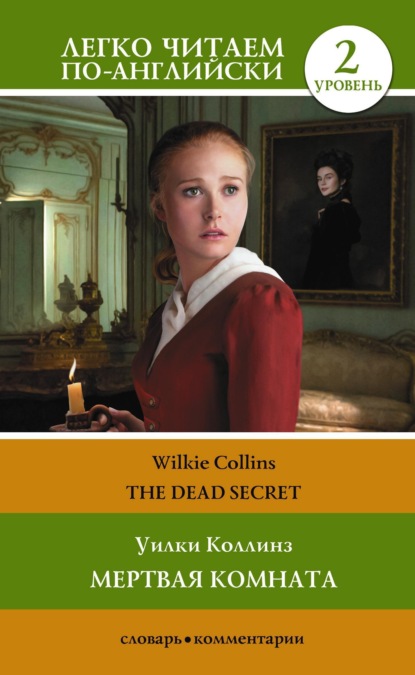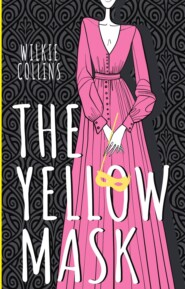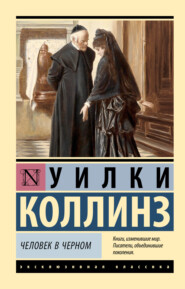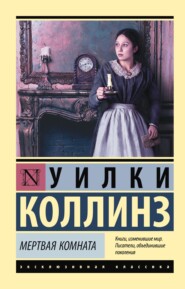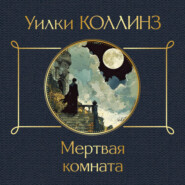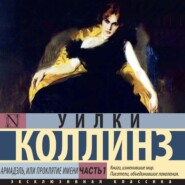По всем вопросам обращайтесь на: info@litportal.ru
(©) 2003-2025.
✖
Мертвая комната. Уровень 2 / The Dead Secret
Настройки чтения
Размер шрифта
Высота строк
Поля
She took the scissors and cut the label from the key. Was it enough? She cut off the other labels, too. Then she retraced her steps to the housekeeper's room, entered it, and hung up the bunch of keys again on the nail in the wall.
After that Sarah hastened back to her bedroom. The candle was still burning feebly in the fresh daylight. She opened the window.
Whether for good or for evil, the fatal Secret was hidden now. She will think more composedly, after that, of herself, and of the uncertain future that lay before her.
The connection between herself and her mistress was severed by death. She knew that Mrs. Treverton, in the last days of her illness, earnestly recommended her maid to Captain Treverton's kindness and protection. But will she accept protection and kindness at the hand of the master whom she was deceiving? The bare idea of such baseness was so revolting, that she decided to leave the house immediately.
And how to leave it? Can she face her master again? His first inquiries will refer to her mistress. Sarah listened at her door in sudden suspicion and fear. Did she hear footsteps? Was it her master?
No; all was silent outside. A few tears rolled over her cheeks as she put on her bonnet. She must leave Porthgenna Tower, and leave it secretly.
Secretly – as a thief? Without a word to her master? Without a letter to thank him for his kindness and to ask his pardon? “Shall I write?” she asked herself, “and leave the letter here?”
Yes. She wrote a few lines addressed to Captain Treverton, in which she wrote that she was hiding a secret from his knowledge. She honestly believes no harm will come to him, or to anyone in whom he is interested. She is asking his pardon for leaving the house secretly. Then she sealed this short note, and left it on her table. She listened again at the door; and began to descend the stairs at Porthgenna Tower for the last time.
At the entrance of the nursery she stopped. The tears began to flow again. She ran to the stairs, reached the kitchen-floor in safety, and left the house.
She diverged to the church; but stopped before she came to it, at the public well. She dropped into the well the little rusty key, the key from the Myrtle Room. Then she hurried on, and entered the church-yard. She came to one of the graves, situated a little apart from the rest. On the head-stone were inscribed these words:
SACRED TO THE MEMORY OF HUGH POLWHEAL, AGED 26 YEARS. HE MET WITH HIS DEATH THROUGH THE FALL OF A ROCK IN PORTHGENNA MINE, DECEMBER 17TH, 1823.
Sarah gathered a few leaves of grass from the grave. Then she said,
“God help and forgive me – it is all done and over now![9 - it is all done and over now! – теперь всему конец!]”
With those words she turned her back on the old house, and followed the moorland path.
Four hours afterward Captain Treverton desired one of the servants at Porthgenna Tower to inform Sarah Leeson that he wished to hear everything about the dying moments of her mistress. The messenger returned with the letter in his hand.
Captain Treverton read the letter, and ordered an immediate search after the missing woman. She was so easy to describe and to recognize, by the premature grayness of her hair, by the odd, scared look in her eyes, that she was traced as far as Truro. In that large town the track of her was lost, and never recovered again.
Nothing explained the nature of the secret at which she hinted in her letter. Her master never saw her again, never heard of her again, after the morning of the twenty-third of August, eighteen hundred and twenty-nine.
Chapter IV
The church of Long Beckley is not very remarkable. The large open space around the church can be approached in three different directions. There is a road from the village, there is a broad gravel walk, which begins at the vicarage gates, and there is a footpath over the fields.
One day three conspirators were advancing along the footpath. The leader of this party was an elderly gentleman, with a weather-beaten[10 - weather-beaten – обветренный] face and a bluff, hearty manner. His two followers were a young gentleman and a young lady. They were talking together in whispers. They were dressed in the morning costume. The faces of both were rather pale.
The young man was blind. Soon the blind man and the young lady were standing together before the altar rails. They were ready to marry.
Soon the ceremony was concluded. Doctor Chennery went to the vicarage breakfast-table. The persons assembled at the breakfast were, first, Mr. Phippen, a guest; secondly, Miss Sturch, a governess; thirdly, fourthly, and fifthly, Miss Louisa Chennery (aged eleven years), Miss Amelia Chennery (aged nine years), and Master Robert Chennery (aged eight years). There was no mother; Doctor Chennery was a widower.
The guest was an old college acquaintance of the vicar's. He was staying at Long Beckley for the benefit of his health. He was not a handsome man. His eyes were watery, large, and light gray. They were always rolling from side to side in a state of moist admiration of something or somebody. His nose was long and drooping. His lips had a lachrymose twist; his stature was small; his head large, bald, and loosely set on his shoulders. Such was Mr. Phippen, the Martyr to Dyspepsia, and the guest of the vicar of Long Beckley.
Miss Sturch, the governess, was a young lady. She was a little, plump, quiet, white-skinned, smiling, neatly dressed girl. Miss Sturch never laughed, and never cried, but she was smiling perpetually.
Miss Sturch's pupils were not remarkable at all. Miss Louisa's habitual weakness was an inveterate tendency to catch cold[11 - to catch cold – простужаться]. Miss Amelia's principal defect was a disposition to eat supplementary dinners and breakfasts. Master Robert was famous for his obtuseness in learning the Multiplication Table. The virtues of all three were of much the same nature – they were genuine children, and they loved Miss Sturch.
Let us describe the vicar himself. Doctor Chennery was the best bowler in the Long Beckley cricket-club. He was a strictly orthodox man in the matter of wine and mutton. He never started disagreeable theories about people's future destinies in the pulpit. He never quarreled with anybody out of the pulpit. In short, he was the most unclerical of clergymen.
As soon as the vicar entered the parlor, the children assailed him with a chorus of shouts.
“I'm sorry. I'm late, Miss Sturch,” said the vicar; “but I have a good excuse.”
“Pray don't mention it, Sir,” said Miss Sturch. “A beautiful morning. I fear we shall have another warm day. Robert, my love, your elbow is on the table. A beautiful morning, indeed!”
“Guess why I am late this morning,” said the vicar.
“You were lying in bed, papa,” cried the three children.
“What do you say, Miss Sturch?” asked Doctor Chennery.
Miss Sturch smiled as usual, rubbed her hands as usual, cleared her throat softly as usual, and excused.
“Phippen,” said the vicar. “Come, guess!”
“My dear friend,” said Mr. Phippen, “don't ask me to guess – I know! I saw what you were eating at dinner yesterday. I saw what you drank after dinner. Pooh! I know. You dear, good soul, you were taking medicine!”
“No!” said Doctor Chennery, with a look of devout gratitude. “No, no; you're all wrong. The fact is, I have been to church. Why? Listen, Miss Sturch – listen, girls, with all your ears. Poor blind young Frankland is a happy man at last – I have married him to our dear Rosamond Treverton this very morning!”
“Without telling us, papa!” cried the two girls together. “We wanted to see it!”
“That was the very reason why I did not tell you, my dears,” answered the vicar. “Young Frankland doesn't like it. He doesn't like to be a blind bridegroom. So we settled to have the wedding at an hour in the morning when no idlers were nearby. I was bound over to the secrecy about the day, and so was my clerk Thomas. Excepting us two, and the bride and bridegroom, and the bride's father, Captain Treverton, nobody knew – ”
“Treverton!” exclaimed Mr. Phippen. “Treverton! (No more tea, dear Miss Sturch). How remarkable! I know the name. (Fill up with water, if you please.) Tell me, my dear doctor (please no sugar), is this Miss Treverton (many thanks; no milk, either) one of the Cornish Trevertons?”
“Yes, she is!” rejoined the vicar. “Her father, Captain Treverton, is the head of the family. The Captain, and Rosamond, and that whimsical old brute of an uncle of hers, Andrew Treverton, are the last members of this rich family.”
“Ah! The bride – the interesting bride! And so she is one of the Cornish Trevertons? I knew something of Andrew years ago. He was a bachelor, like myself, Miss Sturch. Not at all like his brother, the Captain, I suppose? And so she is married? A charming girl, I have no doubt. A charming girl!”
“No better, truer, prettier girl in the world,” said the vicar.
“A very lively, energetic person,” remarked Miss Sturch.
“How I shall miss her!” cried Miss Louisa. “Nobody else amused me as Rosamond did, when I was ill.”
“She was the only girl who played with boys,” said Master Robert. “She caught a ball, Mr. Phippen, Sir, with one hand.”
“Bless me!” said Mr. Phippen. “What an extraordinary wife for a blind man! You said he was blind from his birth, my dear doctor, did you not? Let me see, what was his name? Mr. Frank Something, was it not?”
“No, no – Frankland,” answered the vicar, “Leonard Frankland. And not blind from his birth. It is not much more than a year ago since he could see almost as well as any of us.”
“An accident, I suppose!” said Mr. Phippen. “So an accident happened to his eyes?”
“Not exactly,” said Doctor Chennery. “Leonard Frankland was a difficult child: great constitutional weakness, you know, at first. Well, he liked mechanics, and soon he began to make watches. Curious amusement for a boy. His last work, poor fellow, was the repairing of my watch – here it is. He said he was getting a bad pain at the back of his head, and he saw spots before his eyes. They sent for doctors from London, and blistered him behind the ears and between the shoulders, and drenched the lad with mercury. No use. The sight got worse and worse, flickered and flickered, and went out at last like the flame of a candle. His mother died – luckily for her, poor soul – before that happened. His father took him to oculists in London and oculists in Paris. Some said it was the result of the long weaknesses. Some said it was an apoplectic effusion in his brain. So he is blind now; and blind he will remain, poor dear fellow.”
“You shock me; my dear Chennery, you shock me dreadfully,” said Mr. Phippen. “Especially when you say about weakness after illness. Why, I have had long weaknesses – I have got them now. And I see spots, black spots, dancing black bilious spots. I feel this story in every nerve of my body; I do, indeed!”
After that Sarah hastened back to her bedroom. The candle was still burning feebly in the fresh daylight. She opened the window.
Whether for good or for evil, the fatal Secret was hidden now. She will think more composedly, after that, of herself, and of the uncertain future that lay before her.
The connection between herself and her mistress was severed by death. She knew that Mrs. Treverton, in the last days of her illness, earnestly recommended her maid to Captain Treverton's kindness and protection. But will she accept protection and kindness at the hand of the master whom she was deceiving? The bare idea of such baseness was so revolting, that she decided to leave the house immediately.
And how to leave it? Can she face her master again? His first inquiries will refer to her mistress. Sarah listened at her door in sudden suspicion and fear. Did she hear footsteps? Was it her master?
No; all was silent outside. A few tears rolled over her cheeks as she put on her bonnet. She must leave Porthgenna Tower, and leave it secretly.
Secretly – as a thief? Without a word to her master? Without a letter to thank him for his kindness and to ask his pardon? “Shall I write?” she asked herself, “and leave the letter here?”
Yes. She wrote a few lines addressed to Captain Treverton, in which she wrote that she was hiding a secret from his knowledge. She honestly believes no harm will come to him, or to anyone in whom he is interested. She is asking his pardon for leaving the house secretly. Then she sealed this short note, and left it on her table. She listened again at the door; and began to descend the stairs at Porthgenna Tower for the last time.
At the entrance of the nursery she stopped. The tears began to flow again. She ran to the stairs, reached the kitchen-floor in safety, and left the house.
She diverged to the church; but stopped before she came to it, at the public well. She dropped into the well the little rusty key, the key from the Myrtle Room. Then she hurried on, and entered the church-yard. She came to one of the graves, situated a little apart from the rest. On the head-stone were inscribed these words:
SACRED TO THE MEMORY OF HUGH POLWHEAL, AGED 26 YEARS. HE MET WITH HIS DEATH THROUGH THE FALL OF A ROCK IN PORTHGENNA MINE, DECEMBER 17TH, 1823.
Sarah gathered a few leaves of grass from the grave. Then she said,
“God help and forgive me – it is all done and over now![9 - it is all done and over now! – теперь всему конец!]”
With those words she turned her back on the old house, and followed the moorland path.
Four hours afterward Captain Treverton desired one of the servants at Porthgenna Tower to inform Sarah Leeson that he wished to hear everything about the dying moments of her mistress. The messenger returned with the letter in his hand.
Captain Treverton read the letter, and ordered an immediate search after the missing woman. She was so easy to describe and to recognize, by the premature grayness of her hair, by the odd, scared look in her eyes, that she was traced as far as Truro. In that large town the track of her was lost, and never recovered again.
Nothing explained the nature of the secret at which she hinted in her letter. Her master never saw her again, never heard of her again, after the morning of the twenty-third of August, eighteen hundred and twenty-nine.
Chapter IV
The church of Long Beckley is not very remarkable. The large open space around the church can be approached in three different directions. There is a road from the village, there is a broad gravel walk, which begins at the vicarage gates, and there is a footpath over the fields.
One day three conspirators were advancing along the footpath. The leader of this party was an elderly gentleman, with a weather-beaten[10 - weather-beaten – обветренный] face and a bluff, hearty manner. His two followers were a young gentleman and a young lady. They were talking together in whispers. They were dressed in the morning costume. The faces of both were rather pale.
The young man was blind. Soon the blind man and the young lady were standing together before the altar rails. They were ready to marry.
Soon the ceremony was concluded. Doctor Chennery went to the vicarage breakfast-table. The persons assembled at the breakfast were, first, Mr. Phippen, a guest; secondly, Miss Sturch, a governess; thirdly, fourthly, and fifthly, Miss Louisa Chennery (aged eleven years), Miss Amelia Chennery (aged nine years), and Master Robert Chennery (aged eight years). There was no mother; Doctor Chennery was a widower.
The guest was an old college acquaintance of the vicar's. He was staying at Long Beckley for the benefit of his health. He was not a handsome man. His eyes were watery, large, and light gray. They were always rolling from side to side in a state of moist admiration of something or somebody. His nose was long and drooping. His lips had a lachrymose twist; his stature was small; his head large, bald, and loosely set on his shoulders. Such was Mr. Phippen, the Martyr to Dyspepsia, and the guest of the vicar of Long Beckley.
Miss Sturch, the governess, was a young lady. She was a little, plump, quiet, white-skinned, smiling, neatly dressed girl. Miss Sturch never laughed, and never cried, but she was smiling perpetually.
Miss Sturch's pupils were not remarkable at all. Miss Louisa's habitual weakness was an inveterate tendency to catch cold[11 - to catch cold – простужаться]. Miss Amelia's principal defect was a disposition to eat supplementary dinners and breakfasts. Master Robert was famous for his obtuseness in learning the Multiplication Table. The virtues of all three were of much the same nature – they were genuine children, and they loved Miss Sturch.
Let us describe the vicar himself. Doctor Chennery was the best bowler in the Long Beckley cricket-club. He was a strictly orthodox man in the matter of wine and mutton. He never started disagreeable theories about people's future destinies in the pulpit. He never quarreled with anybody out of the pulpit. In short, he was the most unclerical of clergymen.
As soon as the vicar entered the parlor, the children assailed him with a chorus of shouts.
“I'm sorry. I'm late, Miss Sturch,” said the vicar; “but I have a good excuse.”
“Pray don't mention it, Sir,” said Miss Sturch. “A beautiful morning. I fear we shall have another warm day. Robert, my love, your elbow is on the table. A beautiful morning, indeed!”
“Guess why I am late this morning,” said the vicar.
“You were lying in bed, papa,” cried the three children.
“What do you say, Miss Sturch?” asked Doctor Chennery.
Miss Sturch smiled as usual, rubbed her hands as usual, cleared her throat softly as usual, and excused.
“Phippen,” said the vicar. “Come, guess!”
“My dear friend,” said Mr. Phippen, “don't ask me to guess – I know! I saw what you were eating at dinner yesterday. I saw what you drank after dinner. Pooh! I know. You dear, good soul, you were taking medicine!”
“No!” said Doctor Chennery, with a look of devout gratitude. “No, no; you're all wrong. The fact is, I have been to church. Why? Listen, Miss Sturch – listen, girls, with all your ears. Poor blind young Frankland is a happy man at last – I have married him to our dear Rosamond Treverton this very morning!”
“Without telling us, papa!” cried the two girls together. “We wanted to see it!”
“That was the very reason why I did not tell you, my dears,” answered the vicar. “Young Frankland doesn't like it. He doesn't like to be a blind bridegroom. So we settled to have the wedding at an hour in the morning when no idlers were nearby. I was bound over to the secrecy about the day, and so was my clerk Thomas. Excepting us two, and the bride and bridegroom, and the bride's father, Captain Treverton, nobody knew – ”
“Treverton!” exclaimed Mr. Phippen. “Treverton! (No more tea, dear Miss Sturch). How remarkable! I know the name. (Fill up with water, if you please.) Tell me, my dear doctor (please no sugar), is this Miss Treverton (many thanks; no milk, either) one of the Cornish Trevertons?”
“Yes, she is!” rejoined the vicar. “Her father, Captain Treverton, is the head of the family. The Captain, and Rosamond, and that whimsical old brute of an uncle of hers, Andrew Treverton, are the last members of this rich family.”
“Ah! The bride – the interesting bride! And so she is one of the Cornish Trevertons? I knew something of Andrew years ago. He was a bachelor, like myself, Miss Sturch. Not at all like his brother, the Captain, I suppose? And so she is married? A charming girl, I have no doubt. A charming girl!”
“No better, truer, prettier girl in the world,” said the vicar.
“A very lively, energetic person,” remarked Miss Sturch.
“How I shall miss her!” cried Miss Louisa. “Nobody else amused me as Rosamond did, when I was ill.”
“She was the only girl who played with boys,” said Master Robert. “She caught a ball, Mr. Phippen, Sir, with one hand.”
“Bless me!” said Mr. Phippen. “What an extraordinary wife for a blind man! You said he was blind from his birth, my dear doctor, did you not? Let me see, what was his name? Mr. Frank Something, was it not?”
“No, no – Frankland,” answered the vicar, “Leonard Frankland. And not blind from his birth. It is not much more than a year ago since he could see almost as well as any of us.”
“An accident, I suppose!” said Mr. Phippen. “So an accident happened to his eyes?”
“Not exactly,” said Doctor Chennery. “Leonard Frankland was a difficult child: great constitutional weakness, you know, at first. Well, he liked mechanics, and soon he began to make watches. Curious amusement for a boy. His last work, poor fellow, was the repairing of my watch – here it is. He said he was getting a bad pain at the back of his head, and he saw spots before his eyes. They sent for doctors from London, and blistered him behind the ears and between the shoulders, and drenched the lad with mercury. No use. The sight got worse and worse, flickered and flickered, and went out at last like the flame of a candle. His mother died – luckily for her, poor soul – before that happened. His father took him to oculists in London and oculists in Paris. Some said it was the result of the long weaknesses. Some said it was an apoplectic effusion in his brain. So he is blind now; and blind he will remain, poor dear fellow.”
“You shock me; my dear Chennery, you shock me dreadfully,” said Mr. Phippen. “Especially when you say about weakness after illness. Why, I have had long weaknesses – I have got them now. And I see spots, black spots, dancing black bilious spots. I feel this story in every nerve of my body; I do, indeed!”





